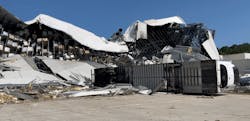So That Happened: Nikola Trucks on Fire, the Death of a Hacker and Pfizer’s Tornado Recovery
Editor’s note: Welcome to So That Happened, our editors’ takes on things going on in the manufacturing world that deserve some extra attention. This will appear regularly in the Member’s Only section of the site.
Nikola Truck Reignites
We all saw last month when five Nikola semi-trucks caught fire, right? The company claimed, and still appears to believe, that the vehicles damaged at its Phoenix headquarters was the work of an arsonist.
This is seemingly based solely on the fact that a car was seen leaving the area around the time the fire was reported. However, the fire department found zero evidence of such a crime, although Nikola has hired a third-party to investigate, the outcome of which will “determine next steps” (AKA a potential recall).
But, now it’s been reported that on Sunday one of the originally damaged trucks reignited… surely the work of the same dastardly arsonist and not, you know, a sign that the battery packs in the vehicles, which were reported to have a defect by Electrek, are defective. Can’t wait to see how that investigation turns out!
Air Liquide Supports Industry Diversity in the US
Industrial gases company Air Liquide has committed to fund the Future of STEM Scholars Initiative (FOSSI), a program that provides scholarships to students pursuing STEM degrees at Historically Black Colleges and Universities.
“We believe it is critical that the workforce of the future reflect the strength and diversity of our communities,” says Michael J. Graff, chairman and CEO, American Air Liquide Holdings, Inc. “Partnership with FOSSI is a perfect example of Air Liquide’s commitment to ‘act for all’ by helping to ensure that the STEM talent necessary for shaping the industry of tomorrow, and a more sustainable future, are prepared for the challenge today.”
Founded in 2020, FOSSI seeks to eliminate financial barriers in higher education for marginalized groups and connects students with additional leadership and mentoring opportunities. Air Liquide joins other corporate supporters who have raised nearly $30 million for hundreds of students since the program’s founding.
Supply Chain Scramble at Pfizer
Pharmaceutical giant Pfizer Inc. is on the hunt for temporary warehousing with the appropriate climate control after a tornado last week ripped through its Rocky Mount, North Carolina, warehousing facility that stored finished medicines, raw materials and packaging.
Carolinas Gateway Partnership President and CEO Norris Tolson told Raleigh’s ABC 11 News on Monday that he was “spending almost all of my time” helping Pfizer find immediate alternate storage space.
The supply of 64 different formulations of 30 different drugs was affected by the disaster, according to a letter Pfizer sent to hospitals this week that temporarily limits how much of those medicines they can buy.
No notable damage occurred to production lines at the 250-acre Rocky Mount site, the largest employer in North Carolina’s Nash County with 3,200 employees. Pfizer pledged that all employees will receive full pay despite any lost work time due to the damage.
The warehouse stored raw materials, packaging and finished medicines. Pfizer’s Rocky Mount campus—one of 10 U.S. Pfizer manufacturing sites—produces 25% of all Pfizer’s sterile injectables, including anesthesia, analgesia, therapeutics, anti-infectives and neuromuscular blockers. Pfizer manufactures 8% of all sterile injectables distributed in the U.S. at its Rocky Mount facility.
Losing “The World’s Most Famous Hacker”
IndustryWeek unfortunately must report on the passing on July 16, 2023 of Kevin Mitnick, 59, of pancreatic cancer. The famous hacker and expert in social engineering, the art of tricking people into willingly giving up login credentials and/or other information, spun his reputation and skills into a successful career as a cybersecurity consultant, or a ‘white-hat hacker,’ serving as the chief hacking officer at cybersecurity security awareness training firm KnowBe4.
In 1995, the New York Times dubbed Mitnick “the nation's most wanted computer outlaw,” on the run after breaking the terms of his probation following an arrest in 1988 for stealing $1 million worth of proprietary software from Digital Equipment Corp.
In 1993, Mitnick broke into phone systems that allowed him to wiretap the FBI agents trying to track him down and disrupt their efforts. He also used radio scanners and software to keep tabs on agents, once leaving a box of donuts for the authorities after learning of their impending raid on his apartment.
After two years on the run, Mitnick in 1995 was finally taken into custody from his North Carolina apartment following a 24-hour stakeout. It took the efforts of another hacker, Tsutomu Shimomura, from whom Mitnick had stolen emails, to finally track down the notorious hacker.
Mitnick was known for breaking into Motorola, Nokia, Novell and Sun Microsystems’ computer networks and purportedly broke into the U.S. military’s network at North American Aerospace Defense Command (Mitnick denied this; the movie ‘Wargames’ was partially based on this supposed hack).
In 1999, Mitnick made a plea agreement and was released from prison in January 2000, but was then barred until December 2002 from using any kind of device that granted internet access.
In Congressional testimony in March 2000, Mitnick said he was motivated by intellectual curiosity about computer networks and the challenge and thrill of hacking, calling his activities ‘simple crimes of trespass.’
Mitnick took his position as chief hacking officer at KnowBe4 in December 2011, producing and testing materials for security awareness training, including anti-social engineering strategies. He is survived by his wife, Kimberly Barry, with whom he ran his private security consulting firm.
About the Author
Anna Smith
News Editor
News Editor
LinkedIn: https://www.linkedin.com/in/anna-m-smith/
Bio: Anna Smith joined IndustryWeek in 2021. She handles IW’s daily newsletters and breaking news of interest to the manufacturing industry. Anna was previously an editorial assistant at New Equipment Digest, Material Handling & Logistics and other publications.

Laura Putre
Senior Editor, IndustryWeek
As senior editor, Laura Putre works with IndustryWeek's editorial contributors and reports on leadership and the automotive industry as they relate to manufacturing. She joined IndustryWeek in 2015 as a staff writer covering workforce issues.
Prior to IndustryWeek, Laura reported on the healthcare industry and covered local news. She was the editor of the Chicago Journal and a staff writer for Cleveland Scene. Her national bylines include The Guardian, Slate, Pacific-Standard and The Root.
Laura was a National Press Foundation fellow in 2022.
Got a story idea? Reach out to Laura at [email protected]
Dennis Scimeca
Dennis Scimeca is a veteran technology journalist with particular experience in vision system technology, machine learning/artificial intelligence, and augmented/mixed/virtual reality (XR), with bylines in consumer, developer, and B2B outlets.
At IndustryWeek, he covers the competitive advantages gained by manufacturers that deploy proven technologies. If you would like to share your story with IndustryWeek, please contact Dennis at [email protected].


